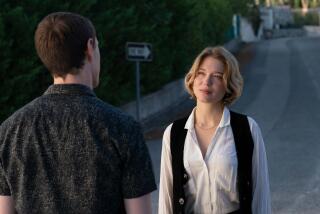Maurice Pialat retrospective in L.A. shows French director’s influence
When Maurice Pialat’s film “Under the Sun of Satan” won the Palme d’Or at Cannes in 1987, the crowd at the Palais des Festivals reportedly was so upset, it responded with boos and catcalls.
The filmmaker reciprocated by chastising them, “If you don’t like me, I can tell you that I don’t like you either.”
The notoriously cranky French director may not have always been the easiest guy to like. That, however, didn’t stop Pialat, who died in 2003, from being one of the biggest influences on contemporary French cinema.
SIGN UP for the free Classic Hollywood newsletter >>
Friday through Thursday, five of Pialat’s finest features will screen in repertory at Laemmle’s Royal in West L.A. Pialat was a contemporary of Jean-Luc Godard and Francois Truffaut, though his career began in earnest a decade later. When “Loulou,” his sixth feature, opened in Los Angeles in 1981, The Times’ Kevin Thomas called it “subtle and unabashedly erotic.”
“What counts most in this sizzling yet wry love story between a pretty bourgeois Parisienne named Nelly (Isabelle Huppert) and an ex-con stud called Loulou (Gérard Depardieu) is her reactions to what is happening and what her fate reveals of the world in which we all live,” Thomas wrote. “This is a classically French tale of a grand passion that is set in the mean side streets of Paris. The challenges of resolving love, work and values, of making choices and of simply living are the same, finally, for all of us.”
In 1991’s “Van Gogh,” Pialat, a former painter, created an unsentimental portrait of the great Dutch artist. Jacques Dutronc plays Vincent in the last months of his life, and Pialat guides the actor to a masterfully brusque, melancholy performance, revealing the grit and despair in which Van Gogh dwelt. Bernard Le Coq, Gérard Séty, Alexandra London and Elsa Zylberstein are also standouts.
Pialat explored the effects of illness on a family in “The Mouth Agape” from 1974. Monique Mélinand plays a woman dying from cancer. Her husband (Hubert Deschamps), son (Philippe Léotard) and daughter-in-law (Nathalie Baye) console her, and through these interactions the depth (and pain) of their relationships are exposed. The film contains autobiographical overtones for the director and represents his most personal and affecting work.
“All the warmth, humor and affection that Pialat brings to ‘Graduate First,’ his highly affecting study of young people in limbo, make it all the more stinging,” Thomas wrote in his 1983 review. “Most appealing and central are Philippe (Philippe Marlaud), and Elisabeth (Sabine Haudepin), whose life we especially wish could have a brighter future. But the kids here seem to be growing old before they’ve had a chance to be young.”
In the aforementioned “Under the Sun of Satan,” Depardieu stars as a tortured rural country priest in 1920s France, who encounters a wild teenage girl (Sandrine Bonnaire) whose sins further torment him. Adapted from a Georges Bernanos novel, it’s a challenging film, as evidenced by its Cannes reception, and it provides Pialat a vehicle for exploring faith and the nature of good and evil. The director appears in the film, portraying the priest’s superior, an older man more experienced with the duality of those two primal forces.
More to Read
Only good movies
Get the Indie Focus newsletter, Mark Olsen's weekly guide to the world of cinema.
You may occasionally receive promotional content from the Los Angeles Times.







